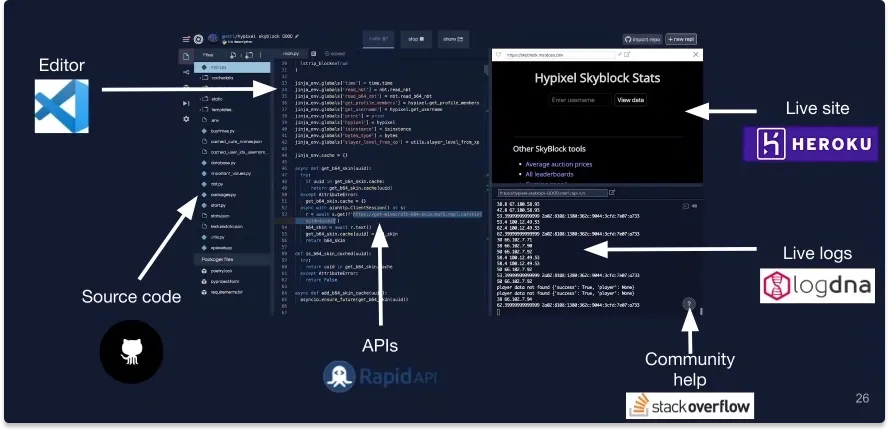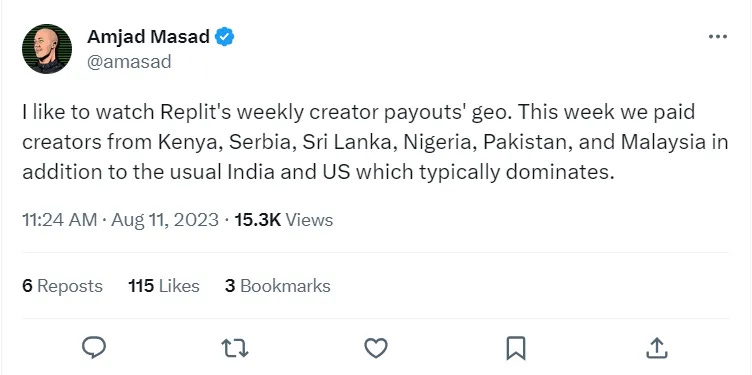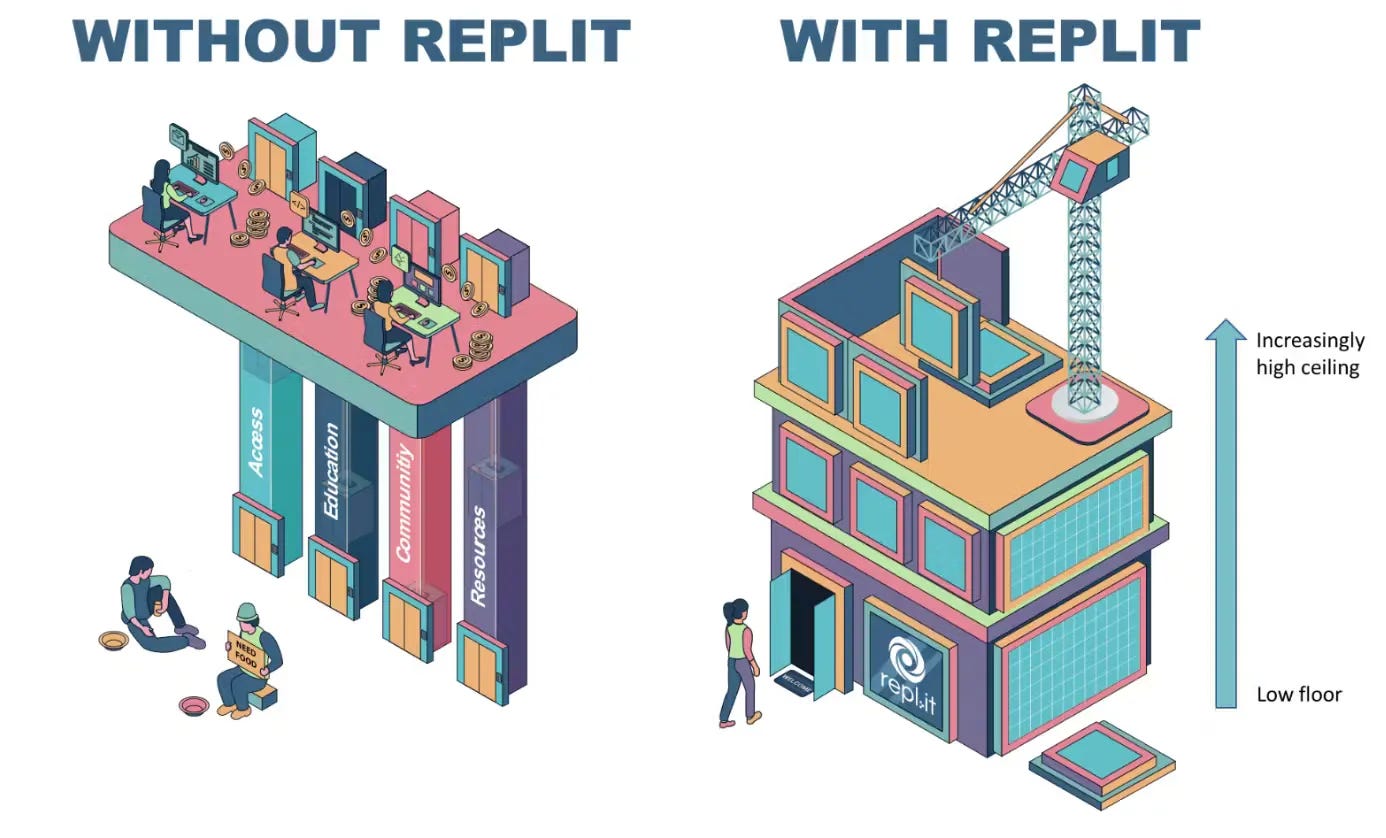Replit - A 3X YC Reject to a $1.7Bn Startup
Replit was a side project that grew up to be a $1.7Bn startup, it is already the number #1 destination for young & hungry hackers, we look at what makes it a $100Bn Company in making.
Celebrating a win: This week, we are celebrating Middleware, one of our portfolio companies from our Demo Day Acess Fund, which just raised its seed round led by 8VC. Vercel’s CEO Guillermo Rauch and Coinbase, Pinterest board member, and Doordash executive Gokul Rajaram also invested in the round.
Replit is a developer platform that offers a browser based integrated development environment (IDE) for cross platform and collaborative coding. Earlier developers needed to use upwards of 6-7 different tools to build, launch softwares, now they can do with just one - Replit.
Founded by Jordanian-American entrepreneur Amjad Masad who was founding engineer at Codeacademy. His brother Faris Masad and his now wife Haya Odeh were also a part of founding team.
Replit was a side project but it grew too big too fast (750K+ users even before YC acceptance) so Amjad decided to take a leap and quit his job to build Replit full time.
Replit is the easiest place to start coding, building, deploying, and hosting apps.
Just like Figma changed designing products by making them a more seamless and collaborative task, Replit did it for coding.
Replit’s coding environment is the center of its product offering. The company built a coding environment currently used by 17M+ developers and made the process much more collaborative, and added more vertically integrated features.
Replit is valued at $1.6Bn, and the company raised $202Mn from some of the bluechip investors - Y Combinator, Andreessen Horowitz, Coatue Management, and Khosla Ventures.
It’s everything software creators need to build simple games, apps, bots, and products, all in one place:-
Integrated Development Environment (IDE) - To write and run code.
Multiplayer - To collaborate with your friends and colleague.
Community - To ask questions from 17M+ users when you are stuck.
Bounties - For companies to create bounties to get their coding problems solved from arguably the best creative coders.
Deployment - To deploy your projects.
Teams for Education - For educators to create classes, assign problem sets, etc.
Young Hungry Hackers
Replit is predicted to be a $100Bn+ company. Its mission is simple, the company wants to be the first place where anyone writes their first line of code.
Replit wants to target young builders, the misfits, the hackers. Amjad insight as a pre-teen hacker himself is that whatever platform the best 15-year-old hackers are using today will be used by everyone in 10 years. That was true of microcomputers in 1980 and of web apps in 2000. As long as teenage hackers love Replit, it’s the future of computing.
Packy McCormick of Not Boring fame took it a step further, he writes, “If you can acquire the youngest users, retain them as they get older, and continue to attract the new cohorts of young users, you will win over time.”
He calls this idea the Compounding Power of Young Users.
Replit makes it simple and easy for young coders to log in and start writing code. Replit 100 Days of Code is one of the most popular courses on the internet, users get to learn the basics of programming, python, and how to build simple things, this is where the lifecycle of most Replit users starts.
Replit’s Multiplayer makes it simple for users to invite their friends and start programming. It also offers Teams for Education for schools to make it easier for primary and secondary school students to start coding on the platform.
Through gamification, Replit created a strong loop of gaining and providing value to/from its users.
Replit Bounties offers its users to solve programming tasks to earn Repls, which can be the currency on the platform and can be used to subscribe to additional features and add extra computing.
As users mature into professional developers, Replit also starts offering more advanced features.
If the user’s code relies on a particular package, Replit pulls it in automatically. If they want to run code from Github, they can plug it into Replit and run it immediately with all of the things it needs to work. This ensures Replit doesn’t lose its users to more traditional IDE platforms like VS Code.
Replit recently also introduced Ghostwriter to help its user code and learn to code using AI, which competes directly with GitHub’s Co-Pilot, but its other additional features help keep its user on the platform itself.
Jordan to Silicon Valley
Amjad brought up in Amman, Jordan, started coding when he was just six years old by the age of twelve, he started coding in Visual Basics, and by the age of fifteen, he sold his first piece of software.
In his early twenties, living in Jordan, he spent his nights in an internet cafe practicing his coding skills.
In the internet cafe, he had to build a coding environment from scratch every day to start coding. Worse, he couldn’t even save his progress to come back to the next night, which gave him the idea of building a Google Doc-like IDE (Integrated Development Environment) on the cloud.
Today Replit, the coding environment he built, is valued at $1.6Bn.
Amjad Masad sees himself in every single Replit user.
When he started Replit, he had his now wife Haya by his side as a co-founder to deal with the ups and downs of entrepreneurship. Haya Odeh, who is also serving Replit as VP of Design and built the entire design systems that helped Replit become a billion-dollar company.
Journey from Codeacademy to Replit
During his coding sessions in the internet cafes, Amjad built an earlier version of Replit and released it on GitHub.
On the other side of the world, Zach Sims and Ryan Bubinski, two Columbia graduates, were tinkering with building a company to teach everyone how to code - Codeacademy. Replit caught their eye on GitHub, and they decided it would be perfect for their company which needed an IDE for their users to practice coding.
After a couple of months of back and forth, Amjad decided to fly to New York and joined Codeacademy as their founding engineer.
But Amjad wanted to be closer to the hacker house of the world -Silicon Valley after two years at Codeacademy and joined Facebook because of their engineering culture and moved to Silicon Valley.
From Side Project to 1Mn+ Users
While at Facebook, Replit was still a side project. It grew too big that Amjad realized it was time for him to quit his job and work on it full-time.
So with his brother and his now-wife, Amjad founded Replit and started working on it full-time. The company was initially rejected by Y Combinator three times, but Replit caught Paul Graham’s attention on Hacker News, who called Sam Altman, then president of YC, to give him a late interview.
The company finally made it to YC, the prime destination of every single early-stage founder who dreams of building a billion-dollar company.
Replit saw phenomenal adoption in its early years.
It had around 750,000 users when they were accepted into YC, and when it raised its seed from a16z, it had already crossed 1 Mn+ users. By the time they reached their Series A in 2020, the company had 6 Mn+ users.
Replit and Secondary Markets
Replit is a $100Bn+ company in the making for a very long time.
None of their investors wanted to sell a single share of the company, and neither did the founder. Even though, due to the macro environment, VCs have stopped writing big checks for Series A or B rounds, Replit was an exception.
The company raised ~$100Mn in Series B from blue-chip tech investors, the round was led by Philippe Laffont’s Coatue Management.
Replit’s secondary market is still crowded with many buyers and but enough sellers.
Some employees, after the liquidity event after their Series B, decide to sell some of their stock options in the secondary market, but there is not much supply from other sources.
The current value of a single Replit share comes to around ~$41.
The supply side of the Replit shares doesn’t seem to be improving very soon because most of their prominent backers are cash-rich reputed VC firms. The firms have enough cash and reputation to survive the funding winter and raise the next round and do not need to sell their holdings before the next 5-6 years.
And why should they?
Going by the current pace, Replit will easily cross a $10Bn+ valuation before that time.
Top Stories
Mastercard has agreed to purchase a minority stake in the fintech division of MTN Group, Africa’s largest cellphone provider, which it values at $5.2 billion. The signing of the formal investment agreements will likely occur very soon as both parties near the end of the regular due diligence process.
Anthropic, an artificial intelligence startup co-founded by former OpenAI leaders, will receive $100 million in funding from one of the biggest mobile carriers in South Korea, SK Telecom (SKT), the telco company announced on Sunday.
Sam Bankman-Fried, the former CEO of the now-bankrupt crypto exchange FTX, had his bail revoked ahead of his October trial. The decision came after allegations that Bankman-Fried leaked the diary of Caroline Ellison, the former CEO of FTX’s investment-arm Alameda Research, to the New York Times.
Please share this newsletter with your friends, family, and colleagues if you feel that it’ll add value to their lives - probably the best compliment we can get :)













